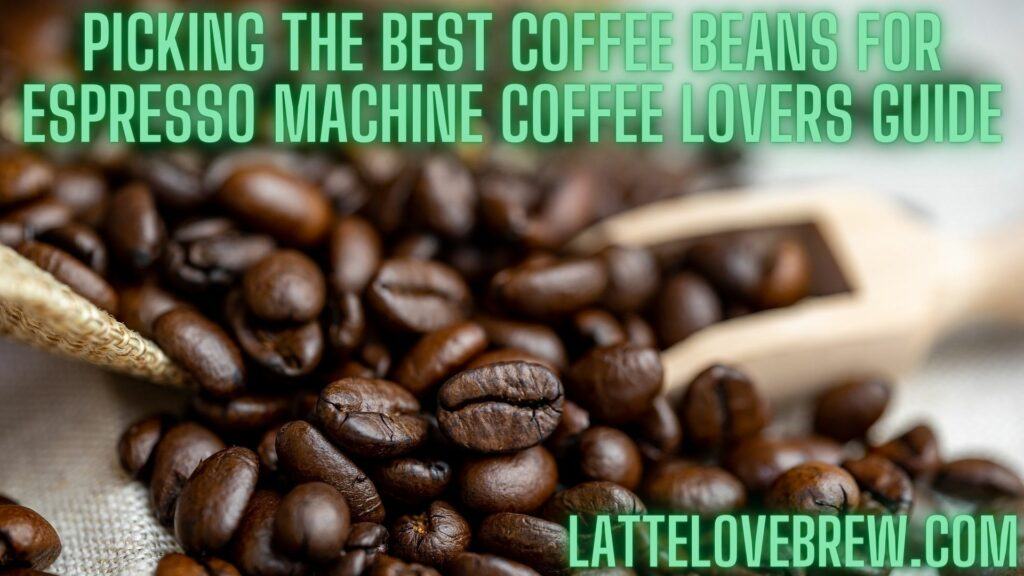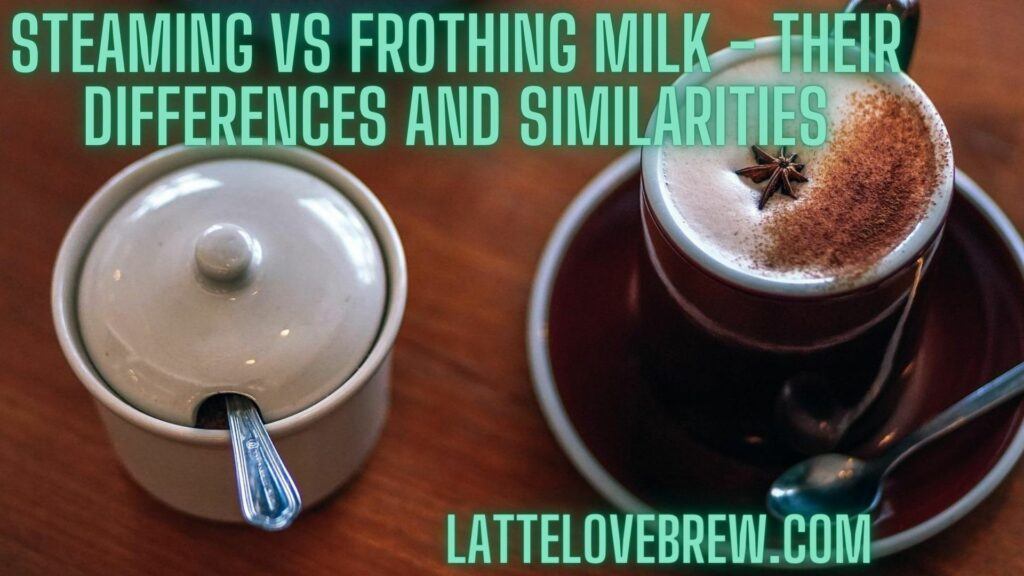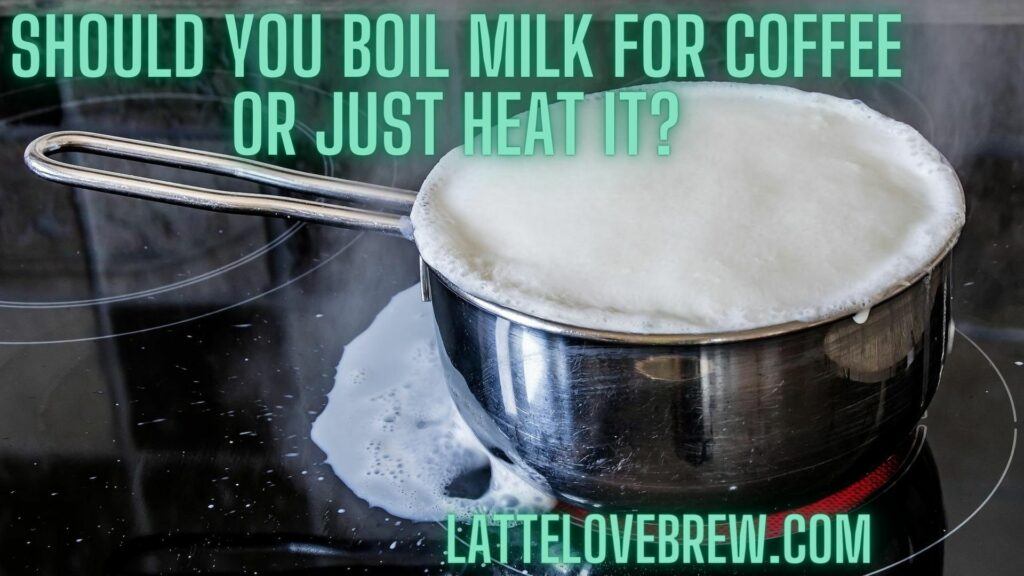Last updated on January 22nd, 2024 at 13:34
When you have your hands on a high quality home espresso machine to make that killer espresso, you need the very best coffee beans for espresso machine. Above all, how to choose and determine what amazing coffee beans are for making espressos.
Once you have those beans, everything else comes down to your barista skills. Without great beans and a great espresso maker, you will not be able to make a coffee with all the complex flavors on par with gourmet coffee shops.
Are you ready to find out how to pick the best coffee beans for an espresso machine?
Yes?
Then keep reading!
What Are Espresso Beans?
Table Of Contents
- 1 What Are Espresso Beans?
- 2 What Is Special About Espresso Beans?
- 3 Arabica Vs Robusta
- 4 What Is the Best Roast Style For Espresso?
- 5 Must An Espresso Be Dark Roasted Always?
- 6 What Is An Omni Roast?
- 7 How Fresh Do Your Coffee Beans Need To Be For An Espresso?
- 8 Which Coffee Beans Are Best for Espresso?
- 9 What Is Single Origin, And Why Is It Important?
- 10 Do You Prefer Adventurous Flavor Or Consistency?
- 11 What To Look For In An Espresso Blend?
- 12 Frequently Asked Questions About Picking The Best Coffee Beans For Espresso Machine
- 13 Frappé-Ing It All Up – Picking The Best Coffee Beans For Espresso Machine
In the simplest of terms and explanations, an espresso bean is a coffee bean that is roasted for slightly longer and at a slightly higher temperature than other coffee beans. To make an espresso shot, they are very finely ground and then brewed in an automatic or semi-automatic espresso machine.
Espresso coffee beans belong to the category of dark roast and thus have a reduced acidity and deeper, fuller body and often chocolate notes and nutty sweetness come through. Only slight flavors from the beans and their origins are notable; most have been roasted out.
Espresso beans, due to their roast level, are rich in the beans natural coffee oils which can be seen from its shiny, glossy veneer. The oil is what contributes to the distinctive rich crema that you associate with a classic espresso.
It is what I call a specialist bean for a specific coffee. If you use regular beans, you won’t get a lot of crema on your espresso that is as good as you would expect.

Read: How long does espresso last?
What Is Special About Espresso Beans?
Espresso beans are special as they are a unique roast for an exact type of coffee. There is no other coffee drink that has its own roasting profile. This is just one reason why you would not use regular coffee beans to pull a shot of espresso.
There are, of course, many more reasons, such as:
- An Espresso Roast Goes Better With Milk: An espresso is the base for many other drinks, such as a latte, cortado, cappuccino, flat white etc. You need a good dark roast to bring the coffee flavor out through the milk.
- They Are Oily Coffee Beans: You need that oiliness and freshness to produce that beautiful crema on top of the shot and a great espresso experience.
- They Are Cheaper: An espresso blend and roast are less expensive than single origin coffee beans. More often than not, a base of cheaper Colombian beans, Indonesian beans and Brazilian beans. Also, there is around a 20% mix of robusta beans thrown into the blend.
- It’s Traditional: An espresso has traditionally been roasted darker and there is a certain espresso flavor that cannot be got with regular beans.

Read: How much does an espresso machine cost
Arabica Vs Robusta
A question and debate that always rears its head in the world of coffee and American coffee lovers and coffee lovers from all over the world discuss is the old Robusta vs Arabica.
Prior to having spent 10 years in Asia, 3 years of which in Vietnam, I’d have dismissed robusta beans completely out of hand. These two heavy weights make up 90% of all coffee beans sold with 60% Arabica and 30% Robusta.
Robusta is usually dismissed right off the bat and out of hand and seen as inferior. This is not at all the case. There are some truly great robusta beans out there – I have a real liking for the Vietnamese Central Highlands and Saigon robusta beans as well as Thai Hill Tribe. You can get great tasty robusta.
Robusta is less acidic and not as sweet as arabica beans. They are also a bit crude and have a serious caffeine kick with 2.2x as much caffeine content when compared to an Arabica equivalent. It also creates a super crema, nice and thick. I love a good rich crema like that.
This is also one of the great points and great things about espresso – you can break all the rules and still end up with a great cup of coffee.
For what it is worth, a good, well-grown robusta can taste every bit as good and tasty as a single origin espresso.
Perhaps, and beside the additional caffeine content, the flavor and super crema is the reason that a lot of blends, including Italian espresso blends, include robusta beans.

What Is the Best Roast Style For Espresso?
Naturally, opinions and personal tastes will vary. I am a fan of a proper espresso and how it should be with a good thick head of crema and tastes great. To get this and achieve that goal, you need good quality beans and ones with a good presence of coffee oils.
To achieve this, a darker roast, Italian roast, Vienna roast, French roast and full city roast work well. These all have a great dark taste, full body with dark chocolate, caramel and fruity hints and a full thick crema due to a good amount of oil.
Dark roasts are more forgiving and have that stronger, more traditional coffee taste and really come through the milk for the milk based drinks you will inevitably make.
Medium dark roasts are also good but will give you a lighter, less dense crema and touches and flavors of milk chocolate.
Must An Espresso Be Dark Roasted Always?
This I have already touched on, and yes, beans for an espresso must be a little bit darker than regular coffee beans used for everyday cups of coffee.
Having touched on it – there are a few shades of dark roast coffee, from lightest to darkest are full city roast, Vienna roast, French roast and Italian roast.
All of these will make you a good, very good espresso. You can identify a dark roast by not just its very dark color, you can tell by its shiny exterior. Notably, an espresso roast is almost always at least a French roast.

What Is An Omni Roast?
An omni roast is a universal roast designed to be used to make many types of coffee and for different brewing styles and techniques. It’s a one size fits all approach to coffee by coffee roasters.
While they are okay and acceptable for run-of-the-mill and above average coffee shops and, well, everyday average espresso with no real great espresso experience.
If you truly enjoy your espresso and espresso-based drinks and enjoy making great coffee with your French press, an omni roast is best avoided.
If you like a good pour over, chemex or drip coffee, then an omni roast will be fine for you due to the rather light taste profile.
How Fresh Do Your Coffee Beans Need To Be For An Espresso?
In a word, very, I love my coffee, all my coffee, not just a shot of espresso to be as fresh as possible. This counts more for an espresso, as the fresher the beans are, the better the quality of the crema.
The crema is produced by the carbon dioxide microbubbles and the hot water under pressure being in contact with the fresh coffee beans.
When there is a lack of crema your espresso will just have the taste of strong black coffee, like an intense caffe Americano. When your coffee beans go off they give off carbon dioxide and have less of the crema and just looks and tastes like an intense black coffee.
Your coffee beans are at their peak freshness 2-3 days after roasting and for 7 to 10 days after that. Some coffee lovers and experts will say your beans are fresh for up to 21 days after roasting. While this is true, absolutely true, the 2-3 days after roasting and for 7 to 10 days, I am referring to the peak freshness period.
This is why I encourage you to either buy your beans in small quantities and often or, the best option, get in on the home roasting revolution and roast your own beans every week or two.
If you are buying your beans – always check for the roasted on date and get the most recent date that you can.
If you can’t buy in small amounts, share the roast with your friends and buy together as part of a coffee club.

Which Coffee Beans Are Best for Espresso?
Without a doubt the very best beans for a high quality espresso coffee is a dark roast. If a blend is what you like to either roast on your own or to buy I’d point my eyes at one with a 20% to 25% mix of robusta beans, Vietnamese robusta beans if you can.
With an espresso blend like this that is super fresh, you can expect a real good coffee and a long-lasting dense crema and a great full-flavored shot, a proper strong coffee with an ample caffeine kick.
What Is Single Origin, And Why Is It Important?
I touched on this earlier, single origin is something to consider – I love single origin beans. A single origin is simply a bean that comes from a single geographic location which can be a single producer, Provence or country.
The term is often abused and slightly misleading and specifically refers to, at most, a particular Provence at most. Inside each country, there are many factors that affect the flavor of the beans, including altitude, soil and the climate.
Which is why, when I look at single origin beans, I focus on a particular Provence and keep notes on how they tasted on a spreadsheet – should I want to make a blend with them at some point.
Single origin beans have taste profiles that are unique to a specific farm or location. This is why, in many ways, coffee is similar to wine and vineyards.
Roasteries offer single origin espresso roasts, but this is almost pointless as by the time you have gone up the roast scale to dark roasts, most of the unique characteristics and flavors of the origin have been roasted out.
Despite having this option, it is not something to consider unless it is a medium dark roast that is on offer and, as I warned earlier, that will detract from the rich crema on your espresso.
Do You Prefer Adventurous Flavor Or Consistency?
That is an important question to ask yourself and to give good consideration to when selecting espresso beans.
If you are looking for an adventurous flavor then a medium dark single roast of a two bean blend (like Starbucks Espresso roast) or do you prefer a more consistent, more traditional espresso taste with a touch more flavor?
Then you are perhaps better looking at the 4 dark roast profiles and worth considering a proper single origin bean that is roasted to a dark roast.
If you can’t find a suitable single origin, the roasting to a full city roast – the lightest of the dark roasts profiles is a project you can take on after joining the home roasting revolution.
What To Look For In An Espresso Blend?
The first thought and the first thing to consider is what you are going to make with the beans. Are you going to use them only for making an espresso or do you want to make other milk based coffee drinks with them?
If you are looking to make milk based drinks, then you will most certainly be needing darker roasts to cut through the milk and bring out that coffee taste. You can consider a good espresso blend here with robusta beans and beans from other locations. East African like Kenyan, Ethiopian and Tanzania work well as blend with Colombian and/or Indonesia Sumatran beans.
If you want to make straight espresso or ristretto shots, then I advise going for a 100% Arabica coffee, perhaps trying out South American blends and Indonesian volcanic beans. I don’t advise trying a robusta or robusta blend, but you can of course experiment if you are adventurous.
I like it, but I have a well-travelled pallet, which was acquired having had the luck of living in a few different countries in the coffee belt.
Frequently Asked Questions About Picking The Best Coffee Beans For Espresso Machine
What Coffee Is Best For Espresso Machine?
Dark roasted coffee is best for making espresso machines and brewing espresso shots. The perfect grind size is 200 microns, a very fine powder-like grind size. Darker roasts produce a better and more dominant flavor that is perfect for an espresso shot and for cutting through the creaminess of milk-based drinks.
Is Any Coffee Bean Good For Espresso?
No, not all types of coffee beans are good for espresso shots. Light roasts and medium roasts are not oily enough to produce a quality layer of crema on top and don’t have that punchy bold taste that you would expect from espresso shots.
Medium-dark roasts and dark roast coffee beans work best that are Arabica coffee beans as arabica beans produce a better taste due to having more flavor than a Robusta bean.
What Beans Are Used In Espresso Machines?
Most of the coffee beans used to make an espresso are a blend of Robusta and Arabica beans. The reason for the blend is both a matter of flavor and for adding more a caffeine kick as the caffeine content of Arabic beans are low.
What Beans Does Starbucks Use For Their Espresso?
Starbucks use 100% Arabica beans which are blended mix of tasty Latin American beans and East African.
Are Arabica Beans Good For Espresso?
Yes, Arabica beans are excellent for making espresso shots. If you want a mild and smooth shot of espresso, use a medium to medium dark roast. Then, once you are used to and familiar with the taste, you can be adventurous and try some blends.
Should Espresso Beans Be Fine Or Coarse?
An espresso bean should be ground to a very fine grind size. Espresso shots are brewed with a very fine powder-like grind size. 200 microns is the ideal grind size. Due to the small grind size, the brew time is very short, 25 seconds with a variance of plus or minus 5 seconds.
Frappé-Ing It All Up – Picking The Best Coffee Beans For Espresso Machine
Now you have read this far, picking the best coffee beans for espresso machine should be a task that is much easier for you now you have a good grounding (pun intended) in espresso beans and the effect and role they play in brewing up an espresso.
Pick the one that best fits your needs and experiment until you make and get the best possible espresso shot.
Join our fun, active and light-hearted coffee community and join in by sharing your outstanding coffee creations, recipes and coffee memes, jokes and those inspiring quotes.







